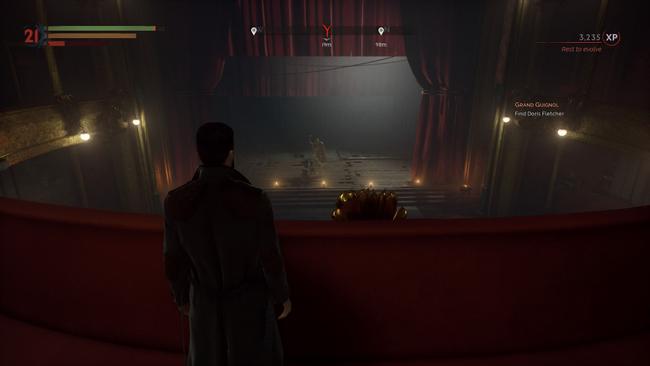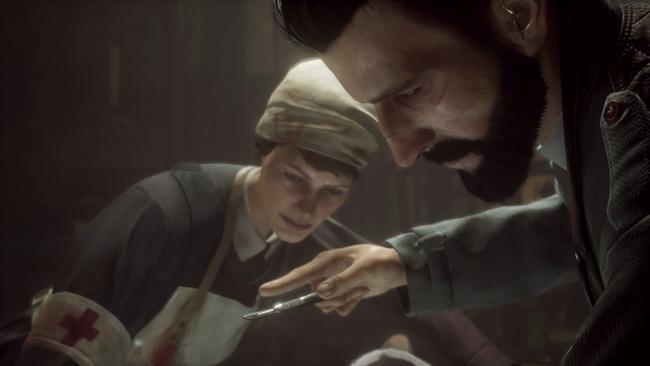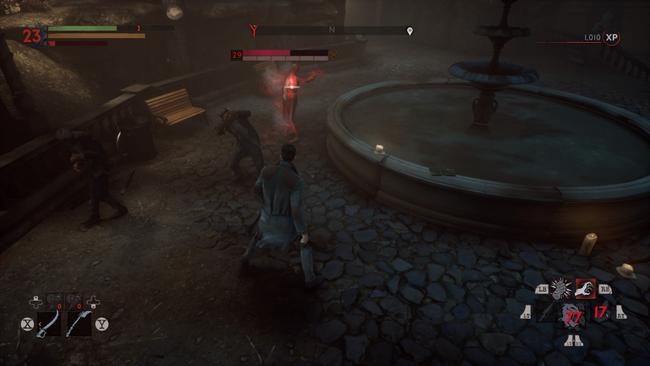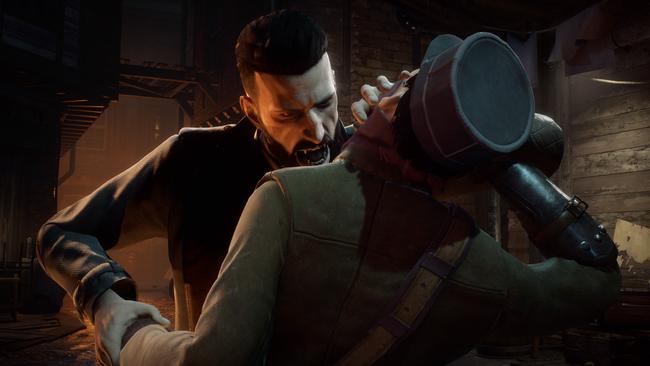Vampyr Review
In 2015, developer Dontnod Entertainment made a name for themselves with Life Is Strange, a seminal release that took everything good about the modern adventure game and expanded upon it in brilliant ways. Now the studio is back with Vampyr, an open-world RPG set in Victorian-era London where vampires and other mythical beasts live among the city’s people. It’s a game with a lot of ambition and is full of clever ideas. Unlike Life Is Strange, however, Vampyr comes up short of its genre expectations.
In Vampyr, you play as Jonathan Reid, a doctor who has been recently transformed into a vampire. The game is set in London during the early 1900s, where a plague is enveloping the city and turning denizens into all manners of horrific creatures. It’s up to Jonathan to find out not only how to treat this plague, but also to discover its source and save London.
There is a lot of promise in Vampyr’s narrative, but unfortunately it never quite lives up to that potential. The idea of a doctor, a person sworn to save lives, being turned into a creature that feeds on humans is a fascinating idea. However, rarely is this contrast presented as an interesting moral dilemma. The theme seems to be caring for others versus looking out for yourself and explores how you balance the two. Too often did I find the story to be distracted with exploring something like vampire society, or individual chapters would focus on a villain-of-the-week trope rather than the game’s core theme. What’s ultimately important is the journey the character goes on, and the lore and one-off stories shouldn’t be the focus of the core story so often.

Jonathan himself is probably the biggest reason why the story never quite works. He’s written in a way so that he’s oddly accepting or indifferent of completely outlandish things. For example, the game begins with him turning into a vampire, then taking part in a horrific act, which he just seems to be too okay with minutes later. It’s a deeply personal moment for the character that should shake him much more than it does. Maybe it’s the script or maybe it’s the line delivery; but either way, the performance is very flat and underscores the moment. It’s hard to take the severity of the situation seriously as an onlooker when the protagonist himself seems so apathetic. This moment is touched upon a few chapters later, but by the time it had come back, I completely forgot all about it because Jonathan rarely brought it up himself.
Morality systems are prevalent in the sort of RPG that involves a lot of conversing with NPCs, and Vampyr’s spin on this is interesting. As mentioned already, Jonathan is a doctor who also happens to be a vampire, so his desire to help the sick contrasts with his need to feed. How this is represented mechanically is in how you level up and gain experience. You can’t really grind out levels from combat, as fighting yields very little experience. Instead, the most efficient way to level up is to feed on humans. The moral dilemma is that you’ll have the opportunity to get to know these characters before you decide whether or not to take a bite out of them.
On paper, this is a really good idea, but the execution is flawed. To feed on a particular character, you need to be able to use an ability called ‘mesmerize’ on them. This ability will level up with you as you progress through the game, as NPCs will require varying levels of this ability. The amount of experience an NPC yields will directly correlate to what level of mesmerize they require. If an NPC will give you 3000 experience, it’ll probably require your mesmerize ability to be level 3 or 4. Once you are able to mesmerize a character, you take them to a secluded area and ‘embrace’ them.

My problem with this system is that it’s a great way to weave vampire lore with gameplay mechanics in an RPG, but it’s a shallow attempt at morality. When you start out, the only people you’ll really be able to mesmerize are patients in a hospital or people just down on their luck in general. You’re forced to be the bad guy at points of the game in order to progress. Feeding on NPCs isn’t as optional as they would lead you to believe either, as the more you progress in the story, the tougher the enemies will get. You’re practically railroaded into feeding on people at points if you ever want to level up and deal with the higher-level enemies. You can do other activities like complete side quests to gain experience, but it gets increasingly hard to take on enemies 6+ levels higher than you. The developers want players to actually feed on NPCs at some point.
I get what Dontnod was going for: vampires are supposed to be monsters, and recent popular media like the Twilight franchise has tarnished their public image with literal sparkling. However, being pushed to eat civilians once in a while feels like a very cheap way of making the player feel bad about their actions. Furthermore, if you eat a particular NPC, you can destabilize an entire district of London and lose out on being able to complete any side quests in that area. If you’re a completionist, it will probably take you several playthroughs to see everything in Vampyr.
The necessity to level up goes hand in hand with enemy engagements, which is one of the least interesting activities in Vampyr. Due to similar style and setting, Bloodborne comes to mind as a point of comparison for combat, with a focus on stamina meter management, head-on melee engagements, and plenty of quick dodging. Vampyr unfortunately lacks the tight, fluid, and responsive controls that you would find in Bloodborne. Dodging in particular feels very floaty as if your character was standing on a floor covered in Vaseline. To make matters worse, enemies tend to feel very spongy when you hit them. I’m not entirely sure what makes trading blows feel like this, but there’s no satisfying ‘crunch’ when you slash away at an enemy. This issue is exacerbated when you have to face enemies that are several levels higher than you as they require significantly more hits. Taking on a group of vampire hunters as a creature of the night shouldn’t feel like pawing away at your face with a wet cloth.

There’s so much time spent in combat that another flaw of the game is just how little there is in the way of enemy variety. There are vampire hunters, skals (think lesser zombie-vampires), and full-on fellow vampires. The vampire hunters are the most common enemy type along with the skals, and it becomes a complete chore to fight the same three or so enemy types repeatedly. More get added later on, but the additions are too sparse over the game’s 25+ hour run time.
Vampyr does, in fact, add some interesting mechanics to this sort of combat, though. You have vampiric abilities that allow you to do things like freeze enemies in place, fire projectiles, and dart around the arena performing quick attacks as a spectre-like figure. They add a bit of a unique flavor to a combat system that’s a bit too derivative at times. You can further customize these abilities and gain new ones the more you level up, as well.
Despite these interesting aspects, the game makes it easy to remember the combat system's weaknesses through its boss fights. Obviously, bosses will have much much larger health bars than standard enemies, so the squishy feeling to melee attacks is more noticeable. Worse yet is bosses often rely on tracking the player’s movement to an unnecessary degree, so it’s easy to get caught in a combo even if you dodged well out of the way of it because the boss is always facing directly towards you. It feels less like a one on one duel and more like a battle with a brute spinning around atop a record player.
My absolute least favorite thing about this game, however, is the number of bosses that are just standard enemies with larger health bars. This admittedly only happens a few times, but all the same, it’s very disappointing to see a standard enemy be dressed up and passed off as a boss. A boss fight should be a memorable encounter that makes the player utilize all the tools and skills they’ve learned up until that point, not just an encounter with an enemy you’ve fought a hundred times over, only that this time it has a big health bar and hits harder.
The London streets are yet another sore spot of Vampyr. First off, there are very few discernible landmarks, and all the districts look too similar to each other. The rich upper-class areas look too much like the slums and poorer districts; everything consists of cramped dark alleyways illuminated by candlelight and filled with the same enemies no matter where you go. There were so many moments where I’d head towards an objective and meet with a dead-end because it’s so easy to get lost due to every pathway looking the same. You have to bust out the overworld map a lot in the game to figure out where exactly you need to go.

Vampyr wears its influences on its sleeve quite proudly, with novels like Interview with the Vampire by Anne Rice being the most obvious source of inspiration. Dontnod is clearly a fan of the beautiful-on-the-surface-yet-hideous-monster-on-the-inside and seductive variety of vampires -- which is good, but too often this game tries to be avant-garde only for it to come across as really goofy. There was one instance where I faced a boss that was a theatre performer, spouting lines like “Touché sir!!” in an overly enthusiastic manner and it made me unintentionally laugh several times. The dark tone of this game is going for is often punctuated by frivolous melodrama that just kills the atmosphere.
Despite all my complaints, I can’t help but admire all that Vampyr sets out to achieve. Dontnod certainly wanted to make a Victorian-era open-world RPG that did justice to these creatures that have been part of folklore for hundreds of years, but ultimately came up short in several areas. It’s ambitious for sure, but with ambition comes risk, and unfortunately, here it provides very little in the way of rewards. There’s too much unsatisfying combat, too many contrived moral choices, and too much corny writing they expect you to take deathly seriously. By the time the credits rolled, I was more than willing to pound a stake through Vampyr’s proverbial heart.